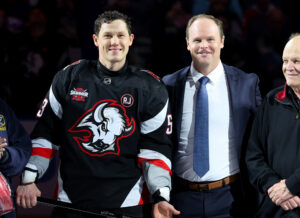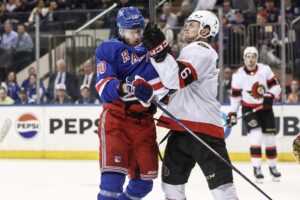There’s a lot of trade rumours swirling around Brenden Dillon, the left-shot defenceman for the San Jose Sharks. NHL teams in playoff contention often trade for a player capable of improving their team for the current season. In return, they give up assets their trade partner can use to improve in future seasons.
The Sharks are not going to the playoffs this year, and Dillon fits the mold of an ideal trade piece as a rental. He is a good, durable player who plays well with others and a player with extensive playoff experience. Perhaps as importantly, he is a player on an expiring contract with a very reasonable cap hit for the final third of a season. All this suggests the Sharks should get a significant return.
The question is, though, should the Sharks trade Dillon?
The Brenden Dillon Options
The options really come down to two basic ones. Keep Brenden Dillon by re-signing him or trade him.
Brenden Dillon Reviews
To borrow from two prominent NHL analysts, Pierre LeBrun and Keith Jones, as both have weighed in on Dillon.
In LeBrun’s case, he described Dillon saying “he’s a number 4 for some teams, a number 5 for others depending on the team. It will not be an issue moving Brenden Dillon. The question is, what can San Jose get out of it? I think it’s probably going to be a second-round pick and maybe a prospect.”
Jones holds a similar view on the player. He is certain Dillon gets traded, expecting he nets the Sharks a second-round pick in return.
Sufficient Trade Return
Assuming LeBrun and Jones are correct, we have an estimate on the return the Sharks can expect.
This begs the next question, is a second-round pick sufficient? The answer, cut a number of ways, is ‘no’. Dillon went undrafted, but his draft class from 2009 suggests he’s put together a career comparable to a late first-round pick. In a variety of metrics, he is in (or close to) the top 30 of his draft class. This includes games played and plus-minus. Though Dillon doesn’t score much, he is still the 10th highest scoring defenceman in the group. The Sharks would need to get a first-round draft pick from a playoff-bound team to expect comparable talent.
A second-round pick, even two, probably doesn’t cut it. From a playoff-bound team, a second-round draft might correspond to roughly the 50th overall pick. A screen of draft picks taken 49th-51st from 2006-14 (more recent picks being harder to judge) shows just two of 27 players better than Dillon (Milan Lucic and Derek Stepan) and only five of the 27 even managed two full NHL seasons worth of games.
Dillon is still very much in his prime and to be blunt, a much better player now than he was just a few seasons ago. Anything the Sharks recoup in a trade, providing LeBrun and Jones are getting it right, is most likely to leave the Sharks less talented, both now and later.
Re-signing Brenden Dillon?
Looking at LeBrun’s interpretation, (a four or a five), one can get a rough estimate of Dillon’s upcoming salary. LeBrun’s assessment suggests Dillon’s upside is somewhere around the average ‘fourth defenceman’ in the league. With 31 teams, this places Dillon at about the 108th best defender in the league (3.5*31). The salary cap hit for the 108th best defender is $3.2million, nearly identical to Dillon’s current deal. Indeed, Dillon is 103rd among defencemen in an annual salary-cap hit at $3.27 million.
What does this suggest? The market for Dillon as an unrestricted free agent is not likely to pay him much more than he earns now. Placing Dillon where LeBrun places him (the worst 4th defenceman or best 5th defenceman), the corresponding cap hit is $2.35 -2.50 million, well below Dillon’s current earnings. If Dillon’s market value is along these lines, the Sharks could retain Dillon for roughly what he earns now.
Dillon’s Value to the Sharks
The major factor in all this is Dillon’s value to the Sharks. This is the area that has both puzzled and frustrated me this season. Earlier in the piece, I mentioned Dillon played well with others. Indeed, he is the best partner for each of the Sharks right-shot defencemen (Brent Burns, Erik Karlsson and Tim Heed) as measured by Corsi-for percent.
Last season, Dillon was partnered with Karlsson for roughly a quarter of the season (just prior to Karlsson’s injury) and the duo was the best pairing in the league, with Karlsson putting up video-game-like numbers and both players averaging an astonishing plus-1 per game.
If Dillon can bring out the best in Karlsson, that matters a lot. The Sharks need Karlsson to be the best defenceman in the league and they have a player who has proven he can take Karlsson to that level. Dillon is the ONLY Sharks defenceman who has proven that. Marc-Edouard Vlasic, Radim Simek and Mario Ferraro have not proven this, and no one else has been particularly close to it.
Further, using Vlasic and Karlsson together, as is currently being done, is a poor use of resources. They shouldn’t so much tip the ice as dominate it, given their combined salary-cap hit of $18.5 million. If the Sharks can get better results by pairing Karlsson with the much lower paid Dillon, they are effectively wasting Vlasic by pairing him with Karlsson.
The problem here is the Sharks coaches. Both former head coach Peter DeBoer and interim head coach Bob Boughner subscribed to this wasteful strategy.
Retaining Dillon
If Dillon leaves (and does not return in free agency), the Sharks will net a second-round pick and perhaps a prospect according to LeBrun and Jones. The net projects to be not nearly as good as Dillon. The team will also add cap space, but leave a substantial hole in the defensive group. Assuming the poorly treated Tim Heed will leave in the offseason (Heed is an expiring UFA), the Sharks blue line is down to only five proven NHL players, two of whom really aren’t that proven. For the Sharks, Dillon is a particularly good fit.
After careful thought, the sorts of deals suggested by LeBrun and Jones are simply inadequate.
If the Sharks can retain Dillon at around his current cap hit, the team should retain him. Dillon has several solid seasons ahead of him. He compliments the team’s high-end defencemen, especially Karlsson, extremely well. He’s a known quantity, far better than the expected return for him.
If other teams value Dillon more highly than LeBrun or Jones, the Sharks can consider trading Dillon.
Is there another corresponding move? Yes. The Sharks need to take the interim tag off Bob Boughner and bring in a new head coach who will optimize the team’s highly talented and extremely pricey defensive corp. In such a plan, Dillon is a key piece. There’s little reason for the Sharks to wait on making this coaching hire. Though the team is playing better under Boughner, he isn’t the answer.
The Net Result
The Sharks should consider trading Dillon if they can get the equivalent of a first-round pick. If that is not available, the team should re-sign him at a similar price to his current deal and use him more wisely. The value is there but is being undermined by the coach’s misuse of the Sharks defencemen.
It is essential the Sharks understand their problems. Brenden Dillon is more solution than a problem. If Jones and LeBrun are reading the situation correctly, the Sharks are better off re-signing Dillon.
Zeke’s Notes
One defenceman the Sharks need to trade is Tim Heed. As mentioned earlier, neither Sharks coach this season has given Heed a reason to stay in San Jose any longer than necessary. Given he’ll be an unrestricted free agent at season’s end, the Sharks should get what they can now. Alas, it’d be easier to get a meaningful return for Heed if he played. Heed’s played just one game since Dec 22. Instead, the Sharks have used the pairing of Radim Simek and Mario Ferraro. Simek is minus-1 since December 22, Ferraro minus-5. For the season (25 games), Heed is minus-3, so there’s not a drop-off in play. Indeed, his possession numbers are better than either Ferraro or Simek. The Sharks need to get the most they can get for any player they choose to trade, including Heed. But they aren’t being smart about it.
Main photo:
Embed from Getty Images






